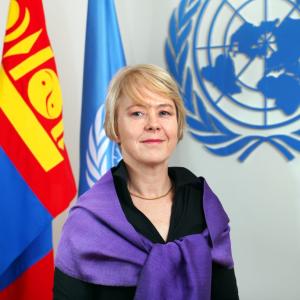Good morning – Mme Secretary General and delegates of the MUM, colleagues from UNESCO National Commission and the Beijing Office.
Welcome to the 2018 Model UNESCO Mongolia conference and thank you for inviting me to kick you off.
The United Nations was founded on the dream of building a better world - a peaceful world, in which no one is left behind. We have come a long way, since the ashes of World War Two. But the road to peace is long. And you as tomorrow’s leaders are inheriting this dream. It’s you who have the power to realize it.
In the words of our former Secretary-General, Kofi Annan, who passed away earlier this year: “You are never too young to lead, and you should never doubt your capacity to triumph, where others have not.”
I commend you for taking part in today’s simulation, and for your early leadership and engagement with UN matters, multilateralism and the pursuit of peace. Peace does not happen by chance. It happens by choice. Peace becomes possible when we chose to communicate, cooperate, compromise and commit.
Practicising dialogue is more important than ever. Because the peace it protects is at stake. Multilateralism is increasingly being subverted by nationalism, with some states acting alone – carving out their interests today, ignoring the implications for tomorrow. We are forgetting how to talk – and how to listen.
The UN, for all its flaws, remains the center of international cooperation and world order. It’s still the best platform we have to give everyone a seat at the table. And it’s brought peace to large parts of the world. But, as shown by recent by the threats of major powers to pull out of key international treaties for nuclear disarmament, this work is never done.
The challenges of the 21st century – climate change, mass migration, trade disputes and terrorism – transcend the boundaries of nation states. With our fates entwined, we need solutions that are global, not shortcuts that are national. The struggles we share can only be solved when we share our visions, commitments and actions too.
For these reasons, consensus is crucial to the new global agenda – the Sustainable Development Goals (SDGs) for 2030. The SDGs are the most ambitious goals the world ever attempted. They aim to end poverty, narrow inequality and ensure our planet can sustain us, in the face of rising temperatures, with unpredictable consequences.
Despite their differences, nation states, including Mongolia, agreed to the SDGs, because our future – our continued existence on earth – depends on us meeting them. And together, we as a world committed to doing just that - proving even the most challenging cooperation is still possible.
Three years on, multilateralism remains key. We can only achieve these goals when we find common ground – and not only between countries. We need to cooperate across society: from governments, to businesses, civil society organisations and local communities. And we need to get more creative in how we do so.
This calls for multiple perspectives – from cities to the countryside – and especially, youth. So I’m delighted to see MUM expand this year, to include young delegates from the towns and soums beyond Ulaanbaatar, too. You are the bridges that can, one day, turn global dreams into local realities.
I know how far some of you have travelled to be here today. So thank you all for investing yourselves in international affairs. I encourage every young person to do the same. I also thank our hard-working volunteers, UNYAP, for taking MUM forward – a fantastic addition to the Model UN initiative, which grows wider every year.
While the process is a simulation, the results are real. Your voices will be heard. In the spirit of multilateralism, the outcomes of the conference will be provided to global decision-makers, such as the UN, to share your perspectives – the perspective of the youth.
This is important because wherever we come from, we inhabit one world. That world will be a far better place when we learn to protect what we share; celebrate what makes us different; and to respect our earth’s limits. Education, culture and science are the tools we need to achieve this.
Let me close with a little personal note. This year marks my 20th year with the UN. Working for the UN has been a dream come true for me. The blue flag inspires me to give my very best every single day, even 20 yrs on, and to make my however small contribution to give a voice who are less privileged and make this world a better and more just place that can sustain itself in the future.
Why am I saying this? I don’t expect every single one of you to join the UN, some may make this their choice others won’t. I say this because I hope that what you will take away from the model UN exercise is the principles of the charter and the dream of a better world and that these ideas will always guide you.
If you indeed live by these principles and values, if you practice dialogue and cooperation, you will make a contribution to the betterment of societies whatever career you chose and wherever you are… whether you are politicians, business leader or leaders in your communities.
So please go out and change the world. Peace is our goal – and multilateralism is our path. Thank you!


















